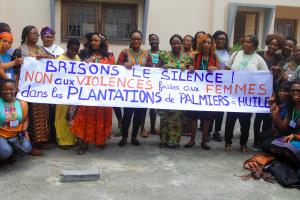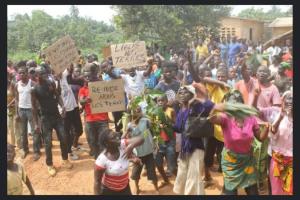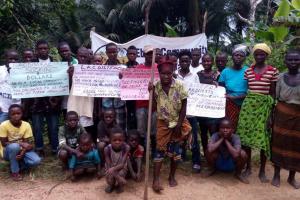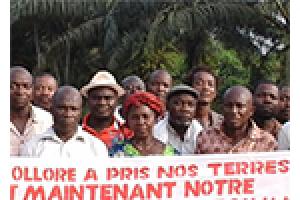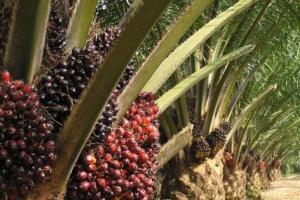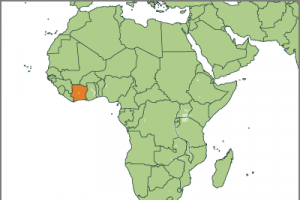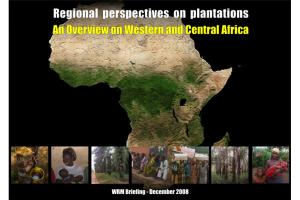We said it in Mundemba, Cameroon, we reiterated it in Port Loko, Sierra Leone, we re-affirm this in Abidjan, Cote d’Ivoire: the abuse against women in and around industrial oil palm plantations must STOP!
Cote d'Ivoire
Other information
18 September 2018
18 September 2018
Download the declaration (pdf)
“Yesterday is gone, live today wisely and since tomorrow cannot be assured,
the struggle starts now…” Hajaratu Abdulahi from Nigeria
No to abuse against women in industrial oil palm plantations
Other information
9 January 2018
Three villages in Côte d’Ivoire were informed in 2015 that the government had granted a concession covering a total of 11 thousand hectares to Compagnie hévéicole de Prikro (CHP), the Ivorian subsidiary of the Belgian corporation Société d’investissement pour l’agriculture tropicale (SIAT), for establishing an industrial rubber tree plantation. A recent report from the NGO GRAIN recounts the communities’ on-going struggle for recuperating their land.
Other information
3 June 2015
Other information
6 May 2015
Peasant farmers deprived of their lands launch a series of occupations on Socfin’s plantations in Cameroon, Liberia, Cambodia and Côte d’Ivoire between the end of April 2015 and the annual shareholder meetings of the Socfin group (27 May) and the Bolloré group (4 June). The Bolloré group is the biggest shareholder (39%) of Socfin, which has industrial oil palm and rubber plantations, among others in the countries where the protests are taking place.
Bulletin articles
7 May 2014
The expansion of industrial oil palm plantations in Africa: A call for greater solidarity and action
In late 2013, a group of representatives of African, Indonesian and international NGOs met with members of La Via Campesina and the African Biodiversity Network in Calabar, Nigeria, to address the massive expansion of industrial oil palm plantations on the African continent and discuss, in particular, the situation in Nigeria, Sierra Leone, Liberia, Cameroon, Benin, Côte d’Ivoire, the Democratic Republic of Congo and Gabon.
Publications
15 December 2008
Oil palm and rubber plantations occupy extensive areas in many countries in tropical Africa. In spite of their social and environmental impacts, until now they have received scant attention both at the national and international level.
Other information
28 August 2004
As has been the case with most Southern countries, Côte d’Ivoire inherited from the colonial period the role of exporter of tropical agricultural products. Apart from the ivory from which the country was named, prior to colonization Côte d’Ivoire had less to offer for trading compared to its eastern neighboring country Ghana, more endowed with gold. So, when the French arrived in the area in the 1880s they found it simple to use the vast fertile land of dense tropical forest for agricultural production.
Bulletin articles
12 July 2002
The village of Zaïpobly is located in Southeast Côte d’Ivoire, in the western outskirts of Taï National Park. This park covers an area of 454,000 hectares and is the largest remnant of the original humid tropical forest in West Africa. It was designated Biosphere Reserve by UNESCO in 1978 and was inscribed on the Natural World Heritage List in 1982, because of its extraordinary specific wealth and because of the numerous endemic species inhabiting it.
Bulletin articles
21 January 2002
For over a decade, the Ivory Coast has been under the influence of IMF structural adjustment programs, of which intensification of exports has been a significant factor. The 1990s saw the heightened pursuit of fiscal and structural reform in the Ivory Coast. The Ivory Coast devalued their currency in 1994 and eliminated export taxes in compliance with the IMF’s adjustment program and in 1995 the country liberalised its domestic markets.
Bulletin articles
12 June 2001
In March this year, planters at Cote d'Ivoire's Ehania agro-industrial oil palm plantation unit embarked on an "unlimited strike action" to press for an increase in the price of palm oil. The strike paralysed the activities of three factories that collect and transform palm oil. The Ehania planters, grouped in an agricultural cooperative called Palm-Ehania, were protesting against a drop in the purchase price of their produce, which had since January 2001 fallen from 23 to 19.07 CFA francs (1 dollar = 700 CFA francs).
